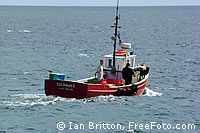Latest scientific advice confirms need for urgent action to safeguard fish stocks
The latest scientific data on European fish stocks, to be published by the international council for the exploration of the sea (ICES) on 24 October, will confirm the need for long-term recovery measures for a number endangered species, according to the Commission. ICES scientists are so concerned about cod stocks in the North Sea, Irish Sea and west of Scotland that they are calling for zero catches in these areas, even if the fish are netted accidentally when fishing for other species. Zero catches are also recommended for North Sea plaice, Irish Sea whiting and southern hake stocks, as the numbers of each species within these sectors are close to their lowest ever recorded levels. Commenting on the situation facing cod stocks, David Griffith, General Secretary of ICES, said: '[W]e have had to resort to recommending zero catches as a final line in the sand, to give them some respite. If they are given the chance to return to their former productive states now, we hope that in the future they will be able to support valuable fisheries again.' The latest ICES findings do offer some hope, however, revealing that some stocks are healthy and even increasing in size. The North Sea haddock stock, for example, is at its highest level for thirty years, and the Northeast Atlantic mackerel stock is described as being in good shape.

